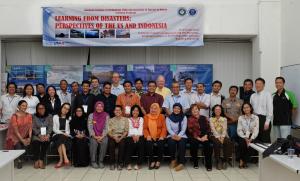UHM faculty, students offer disaster risk reduction training in Indonesia
University of Hawaiʻi at MānoaProfessor, Social Sciences, Urban and Regional Planning
Marge Porter, 956-0605
Social Sciences, NDPTC
A UH Mānoa team of faculty and graduate students is delivering workshops at Bandung Institute of Technology (ITB) this week to emergency managers, first responders and others working on disaster risk reduction in Indonesia. Building upon programs within the College of Social Sciences’ Department of Urban and Regional Planning and its Disaster Management and Humanitarian Assistance Program and National Disaster Preparedness Training Center (NDPTC), the training covers disaster management, risk reduction, recovery from disasters, climate adaptation, and strategies for building community resilience.
Led by Drs. Karl Kim and Dolores Foley of UHM's Urban and Regional Planning Department, along with faculty from ITB, the week-long course, titled "Learning from Disasters: Perspectives from the U.S. and Indonesia," provides participants with insights into international best practices in the field of disaster science.
Said Dr. Wilmar Salim, head of ITB’s urban planning program, “We value the partnership, exchange and commitment to build resilient communities through training, education and research. Indonesia has seen numerous natural hazards in recent years. This, plus increased urbanization and greater exposure to flooding, volcanoes, earthquakes and other hazards, has greatly increased the country’s need for training that integrates hazard mitigation and urban planning. The special focus of this training, which is on preparedness for island communities, directly addresses this growing need.”
Added Kim, UH Mānoa Urban and Regional Planning professor and executive director of NDPTC, “This training is part of UH Mānoa’s continuing efforts to support underserved communities throughout the Asia-Pacific region, which are experiencing tremendous growth and increased exposure to disasters. It is also part of a broader commitment by the university to address challenges that face our communities and the world and improve quality of life.”
Participants in the workshop, which concludes June 21, include those coming from national, provincial and local government agencies, non-governmental organizations, universities and international philanthropic organizations.
In addition to this week-long course, the group will also be providing workshops in other locations in Indonesia, as part of a three-year project funded by the U.S. Agency for International Development (USAID) and the Office of U.S. Foreign Disaster Assistance (OFDA).
Indonesia, comprised of approximately 17,500 islands, is the largest country in Southeast Asia. It is situated at a major juncture of the earth’s tectonic plates and is home to over 100 active volcanoes.
(Full photo caption) Faculty and graduate students from UH Mānoa and faculty from Bandung Institute of Technology take a group photo at a workshop in Indonesia. Concluding June 21, the training provided insights into international best practices in the field of disaster science. UHM's Dolores Foley is seated, third from right, and Dr. Karl Kim is standing, second from right.
The Department of Urban and Regional Planning in the College of Social Sciences at the University of Hawai‘i at Mānoa fosters a multidisciplinary set of intellectual and practical tools to improve the quality of life for present and future generations, both locally and globally, through planning, public policy and social collaboration.
The National Disaster Preparedness Training Center (NDPTC) is a member of the National Domestic Preparedness Consortium, which was expanded in 2007 to address all-hazards capabilities by the addition of the University of Hawai‘i. The NDPTC is authorized to develop and deliver training and educational programs related to homeland security and disaster management, with a specific focus on natural hazards, coastal communities and the special needs and opportunities of islands and territories. The NDPTC actively engages internally with FEMA and the University of Hawai‘i, as well as with external partners across the region to integrate the delivery of its trainings, products and services.
The Disaster Management and Humanitarian Assistance Program is in the Department of Urban and Regional Planning at College of Social Sciences at the University of Hawai‘i at Mānoa. It is a graduate certificate program organized around the “all-hazards” and “all phases” principles, which implicates a diverse range of disciplinary points of view on the problem of disasters and assistance. Students from departments including meteorology, volcanology, social work, medicine, law, geography, psychology, as well as urban planning have all had coursework credited towards the DMHA field of study.
The College of Social Sciences (CSS) at the University of Hawai‘i at Mānoa is engaged in a broad range of research endeavors that address fundamental questions about human behavior and the workings of local, national and international political, social, economic and cultural institutions. Its vibrant student-centered academic climate supports outstanding scholarship through internships, and active and service learning approaches to teaching that prepare students for the life-long pursuit of knowledge.

